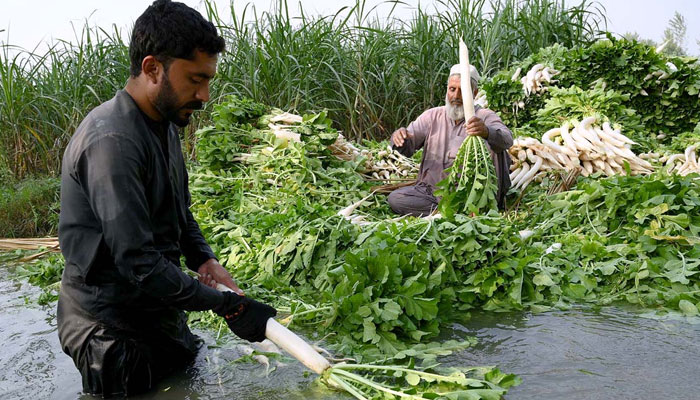Preserving Swat’s bounty: Entrepreneur tackles food wastage, creates jobs
MINGORA: Asif Habib, a 27-year-old entrepreneur from Matta area of Swat district, has introduced a new method to preserve fruits and vegetables, significantly reducing waste while creating jobs for locals.
Habib established a factory, Fruit Zoo, where fruits and vegetables are preserved through advanced drying techniques, extending their shelf life.
Swat, known for its orchards, produces over 150 metric tons of fruit annually, with around 45-50% going to waste due to inadequate preservation methods. Habib’s initiative addresses this issue, ensuring that Swat’s produce is available year-round.
Fruit Zoo uses both natural sunlight and artificial drying methods to preserve fruits such as Japanese plums, apricots, peaches, and apples, along with vegetables like spinach, onions, tomatoes, and potatoes. The products are then supplied to local markets and other districts in the province.
Asif plans to expand his operations across the country and eventually into international markets.
Japanese plum cultivation in Swat spans approximately 5,000 acres, yielding about 50,000 tons annually. According to local farmers, 50-55% of this yield typically goes to waste.
Sultan Ali, a seasoned dried fruit vendor in Mingora, stated: “There’s a demand for Swat’s dried fruits, but we mostly stock dried fruits from Afghanistan and Gilgit-Baltistan. If we receive dried fruits from Swat, we will gladly sell them to meet customer demand.”
Ali added that Swat’s tourism could further boost demand for locally sourced dried fruits.
“Tourists often take dried fruits as souvenirs. By offering them Swat’s own dried produce, we could enhance their experience and support local businesses,” he added. Habib’s venture also responds to climate challenges impacting local crops. “The recent hailstorm and climate shifts damaged many crops, which motivated us to take action. We collect fruits from farmers, wash, cut, and dry them under sunlight or with machines,” he added. Sun drying takes about six days, while machine drying takes six hours.
To improve efficiency, Habib invested Rs2.2 million in machinery from Punjab, allowing for faster drying and reducing waste. The factory now employs around ten local workers who receive daily wages, and plans for expansion are underway.
Customer response has been encouraging, with profits exceeding 50%. Dried fruits from Fruit Zoo sell for Rs500 to Rs2,000 per kilogram in local markets and are especially popular among tourists.
Agriculture experts believe that initiatives like Fruit Zoo can reduce waste, create new industries, and provide a valuable boost to the national economy.
-
 Ethan Hawke Reflects On Hollywood Success As Fifth Oscar Nomination Arrives
Ethan Hawke Reflects On Hollywood Success As Fifth Oscar Nomination Arrives -
 Tom Cruise Feeling Down In The Dumps Post A Series Of Failed Romances: Report
Tom Cruise Feeling Down In The Dumps Post A Series Of Failed Romances: Report -
 'The Pitt' Producer Reveals Why He Was Nervous For The New Ep Of Season Two
'The Pitt' Producer Reveals Why He Was Nervous For The New Ep Of Season Two -
 Maggie Gyllenhaal Gets Honest About Being Jealous Of Jake Gyllenhaal
Maggie Gyllenhaal Gets Honest About Being Jealous Of Jake Gyllenhaal -
 'Bridgerton' Star Luke Thompson Gets Honest About Season Five
'Bridgerton' Star Luke Thompson Gets Honest About Season Five -
 Prince William On Verge Of Breakdown Because Of 'disgraced' Andrew
Prince William On Verge Of Breakdown Because Of 'disgraced' Andrew -
 Tig Notaro Reflects On Oscar Nod For 'Come See Me In The Good Light': 'I Was Sleeping'
Tig Notaro Reflects On Oscar Nod For 'Come See Me In The Good Light': 'I Was Sleeping' -
 Kenyon Sadiq Sets 40-yard Dash Record At NFL Scouting Combine, Eyes First Round
Kenyon Sadiq Sets 40-yard Dash Record At NFL Scouting Combine, Eyes First Round -
 Talk Show Host Drops Hint About Taylor Swift, Travis Kelce Wedding Date
Talk Show Host Drops Hint About Taylor Swift, Travis Kelce Wedding Date -
 Andrew Scandal Brings New Worries For Prince Harry, Meghan Markle
Andrew Scandal Brings New Worries For Prince Harry, Meghan Markle -
 King Charles Imposes New Restrictions On Ex-Prince Andrew In Surprise Move
King Charles Imposes New Restrictions On Ex-Prince Andrew In Surprise Move -
 Chris Hemsworth Reveals How Elsa Pataky Guides His Career Moves
Chris Hemsworth Reveals How Elsa Pataky Guides His Career Moves -
 Was Travis Barker In A Relationship With Kim Kardashian Before Marrying Her Sister?
Was Travis Barker In A Relationship With Kim Kardashian Before Marrying Her Sister? -
 Brad Pitt Feeling Down In The Dumps After Kids' Snubs As Pals Continue To Paint Angelina Jolie A Villain
Brad Pitt Feeling Down In The Dumps After Kids' Snubs As Pals Continue To Paint Angelina Jolie A Villain -
 Ex-PM Speaks Out On Andrew Mountbatten-Windsor In Newspaper Column
Ex-PM Speaks Out On Andrew Mountbatten-Windsor In Newspaper Column -
 Eric Dane Remembered In Glowing Tribute By Trans Activist In 'Grey's Anatomy'
Eric Dane Remembered In Glowing Tribute By Trans Activist In 'Grey's Anatomy'




